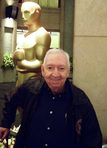How to Become a Better Writer
In the last blog, you may have discovered for the first time The Gunning Fog Index. This tool calculates the readability level of your writing. As you found out, the index tells you the years of formal education needed to grasp the text at a first reading or listening. Hollywood and the publishing community use The Fog Index to confirm that text can be read or understood by their intended audiences. If Hollywood produces a motion picture that has a high Fog Index, then that film will for sure have a very limited audience and probably will not make any money. The same with publishers of books and magazines. What do you think The Fog Index is for popular magazines like People or Entertainment Weekly? What about Harlequin romance novels?
You can safely say that People Magazine, Harlequin and your favorite sit com all have two things in common: (1) very, very few three-plus syllable words and (2) sentences that are never longer than 15 to 16 words. The bottom line in writing for commercial outlets is to watch the above two items and thereby try to place yourself as closely you can to a 7th or 8th grade index.
Lets look at another item: A résumé. Most people write résumés loaded with tons of three-syllable plus words and sentences that are far too long. Let’s say that the person reading all those résumés received 80 submissions. If he or she takes thirty seconds (7th to 8th grade level) to read each résumé, it would take 40 minutes. However, if the writers of the résumés used a lot of many-syllable words and long sentences, it could take them two to four minutes with each resume. That could well result in over two to three hours of reading just for 80 resumes. What if the personal director received 200 résumés? Dire fatigue would set in. Even so, the reader will probably pick the résumés that can be perused and understood quickly, which is only about ten percent. If you were the person doing the reading, wouldn’t you like to do the job faster? The chances are that the ten percent will get noticed and the other ninety percent will be relocated to the garbage can.
Our brains get tired when we read, especially when we have to spend too much time in the process. If you can use the word “boss” instead of “manager”, you’ve gone from three syllables down to one and saved your reader some time in brain energy. Do this a lot, and your reader will love you for it. So, whether it be for a résumé, magazine article, book or screenplay, watch the number of three-syllable plus words and sentences over 16 words.
You can see that READABLILTY is truly the heart of money-making writing. If you’re aiming for a profitable career as a writer, then you must write directly to your audience. Studies show that writing slightly below the reader’s level makes for the most comfortable and meaningful reading.
Most amateur and unskilled writers tend to write at too difficult a level. The most likely idea behind this is the desire to impress the reader. Perhaps it may be that some of you think good writing has to be stiff and formal.

Jack in Sapporo, Japan, last year with his youngest group of writing students ever.
Writing in language that is adapted to your reader is not as easy as it may first appear. For openers, you may have the “literary mode” ingrained in you, which stresses ego over reader and unusual words over familiar ones.
To promote good writing habits, be sure to severely limit the number of three-plus words you use, and make sure your sentences are fewer than 17 words. In addition, make the following rules routine in your writing:
Use familiar words (use the world old not antiquated)
Choose a short over a long word. (final not definitive)
Use concrete nouns: These are nouns you can touch such as chair. Try to limit the number of abstract nouns (nouns you cannot touch) such as cancellation, idea, reason, thought, etc. Abstract nouns tire the reader more because the brain is stressed when it is trying to visualize things you can’t see or touch. Working with concrete nouns is not tiring because it’s a simple thing to visualize them. Too many abstract nouns will cause a reader to stop every now and then to give his or her mind a break.
Use “to be”, “have/has” and “get” as few times as possible. Try for an action word in their place.
(no) They are busy.
(yes) They work a lot.
Get rid of too many words to say the same thing:
(no) I took the test and passed it.
(yes) I passed the test.
Be specific, not general.
(yes) A 53% loss
(no) a significant loss.
Use positive rather than negative.
(no) I can’t pay you until June.
(yes) I can pay you in June.
Excessive sentence structure: Only have TWO different thoughts in a sentence. Never have THREE or more thoughts in the same sentence. Otherwise the listener or reader will forget one of the three. (If it’s on the stage or in a film and this is done, you can bet lots of people will ask the person next to them, “What did she or he say?”
(bad) I go to town on Tuesdays and I go to the shopping mall and I check out the bargains.
(good) I go to town on Tuesdays. I go to the shopping mall and check out the bargains.
Be very careful using the word IT. IT stands for something. Try to tell what “it” stands for and try to find some way to replace “it” without sounding repetitious.
(bad) I like ice cream but It isn’t good for me because it has too many calories.
(good) I like ice cream. Such deserts are not good for me because of the calories.
The next blog I will be answering your questions. Be sure to send them in to me. In the meantime, GOOD WRITING!



